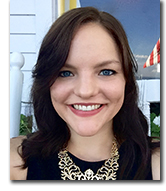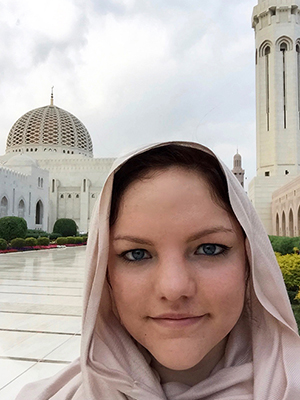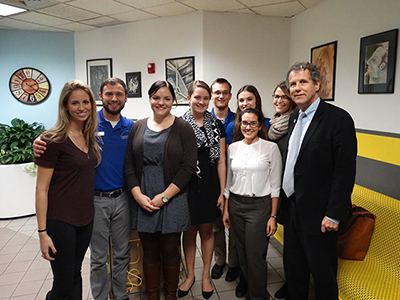
- senior Anthropology major
- minors in Global Health and Arabic
- from Cincinnati, OH
- worked with hypertensive patients during an Over-the-Rhine internship program
- studied Middle Eastern culture on Miami's first winter-term trip to Oman in 2015
"The breadth of knowledge that I have obtained has been fantastic. There are a number of different classes I've taken that I wouldn't have if I had just focused on anthropology, Arabic, global health studies, or any other particular discipline. This includes quite a few biology, history, and literature courses."
Why Miami?
"I'm from Cincinnati, and when I was deciding where to go to school, I knew that I wanted to stay in-state. I was also looking at class size, atmosphere, and other factors, and all of those are what led me to choose Miami over all the others — even without visiting the campus!
"In addition to two of my cousins and my grandfather, I knew a lot of people that came to Miami from my graduating class. I actually roomed with a girl that I knew in high school, and I really liked having a new sense of freedom, including being able to pick whichever classes I wanted and looking into experiences that I might never have done before.
"On top of all that, I knew we have a lot of choices for study abroad and internships that other people might not have access to, and I've really enjoyed taking advantage of these opportunities. They have given me practical skills that I'll be able to use in the workplace."
Best Miami Experiences
"As I started taking classes in anthropology, I've really appreciated this way of understanding the world — you don't make assumptions about people or why and how they're behaving. You just try to see things from their perspective based on their positions in the world.
"This has been really helpful, not just as an anthropologist but as a person. It's extremely advantageous in public health — to be able to understand people so that you can help them.
"One of my key mentors has been Cameron Hay-Rollins, who everyone calls Dr. Hay. I've really enjoyed her classes, particularly her intro global health studies class. She's been very influential in getting me to sign up for my minor and and throughout my entire Miami experience. I've talked to her a lot about public health, medical anthropology, and grad school for anthropology, all of which I'm interested in pursuing after I graduate this spring.
"Elizabeth Bergman, who teaches Arabic in the GRAMELAC (German, Russian, Asian, & Middle Eastern Languages & Cultures) department has also been a huge influence. She has helped me with giving me lots of advice on grad school opportunities. She also co-led a student trip to Oman in January 2015, which was an amazing, extraordinary, and illuminating experience that I'd jumped into almost as a whim.

Jill Elfers stands in front of the Sultan Qaboos Grand Mosque in Oman.
"A lot of people don't have the opportunity to go to the Arab world, and I was happy to experience Arab culture in a context that wasn't dominated by rhetoric about Islamic extremism or terrorist organizations. Our group had a mini lecture series in which various people would come and take us through various experiences, such as going to a market or seeing ruins or meeting an Omani family for dinner.
"In Oman we focused on Ibadi Islam and learned about the ancient canals and waterway systems that they still use. We also looked at politics, environmental issues, and just understanding Oman and the Omani people as they are. In the marketplace I even bartered in Arabic! I found that people are always appreciative when you use their language within their cultural context, so it was amazing just to meet the Omani people the same as you would with anyone else, not as someone you're studying.
"Another great Miami experience I've had came my way through Thomas Dutton, a Miami professor of community engagement who runs the Center for Community Engagement in Over-the-Rhine. He helped me get an amazing public health-related internship that has given me a different perspective and real-world experience."
Miami and Liberal Arts Education
"The liberal arts have given me a new perspective on how to approach the world and how to approach people. Not just as a professional, but just as a person. It helps you to understand people and be more empathetic.
"The breadth of knowledge that I have obtained has been fantastic. There are a number of different classes I've taken that I wouldn't have if I had just focused on anthropology, Arabic, global health studies, or any other particular discipline. This includes quite a few biology, history, and literature courses.
"One example is an amazing history class that I took as a sophomore. It was called The Making of Modern Africa [HST 225]. It gave a really different context of understanding the African continent, and I think it helped me understand the complex issues that go into the study of global health, including the historical means by which they came about. I don't think I would've come to understand global health problems without that class."
Working with Hypertensive Patients in Over-the-Rhine
"The Over-the-Rhine program, which I took part in during the whole fall semester of 2015, really set me on a path of public health. We lived and worked in the community, and I was placed in an internship at Crossroad Health Center.

Jill Elfers (third from left), other Crossroad Health Center interns and employees, and US Senator Sherrod Brown (right) pose in the center's pharmacy.
"Crossroad Health Center is a federally qualified health clinic in Cincinnati that serves the local population, over 90% of whom live 200% below the poverty line. I joined a care and coordination team whose role was to help people get to referral appointments. Each of us were responsible for a chronic illness, and I was in charge of patients diagnosed with hypertension. On my very first day I was given a list of patients and told to figure out an intervention to help them!
"I was the only Anthropology major among med school students, graduate students in public health, and even a law student. We were all interested in different avenues of public health, and working together was amazing because the nature of the interdisciplinary work allowed all of us, coming from really different perspectives, to get together and collaborate and come up with solutions.
"Our mission in Over-the-Rhine was to build a system where, if someone needed help, they wouldn't fall through the cracks. People living well below the federal poverty line simply don't have the same safety net that others in middle class America do, so my job was to call patients, help schedule their appointments, help request medication, help coordinate a ride, provide information on eating healthy, and so on.
"For me, Crossroad Health Center was really my best example of doing an internship that was real work. It was about helping people in the community. It wasn't abstract, it wasn’t theoretical — it was real world, practical, 'here's this problem and we're going to try to fix it.' It truly helped me grow as a person."
Advice to Students
"My best advice is to go someplace or do something that you would never think about normally. When you do something or go somewhere that is just completely new and different, it can help you just completely realign the way you see things in the world!"
[February 2016]
 Miami University Oxford, Ohio est. 1809
College of Arts and Science
Miami University Oxford, Ohio est. 1809
College of Arts and Science
 Miami University Oxford, Ohio est. 1809
College of Arts and Science
Miami University Oxford, Ohio est. 1809
College of Arts and Science